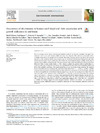Identificador persistente para citar o vincular este elemento:
https://accedacris.ulpgc.es/jspui/handle/10553/40319
| Título: | Occurrence of 44 elements in human cord blood and their association with growth indicators in newborns | Autores/as: | Cabrera Rodríguez, Raul Pérez Luzardo, Octavio L González Antuña, Ana Domínguez Boada, Luis María Almeida-González, Maira Camacho, Maria Zumbado Peña, Manuel Luis Carolina Acosta-Dacal, Andrea Rial Berriel, Cristian Henríquez-Hernandez, Luis A. |
Clasificación UNESCO: | 32 Ciencias médicas 3214 Toxicología |
Palabras clave: | Heavy metals E-waste Rare earth elements Birth weight Bismuth |
Fecha de publicación: | 2018 | Publicación seriada: | Environment International | Resumen: | There is growing concern about environmental pollution produced by elements, including "emerging" contaminants, such as rare earth elements (REE) and other trace elements (TE), which are extensively and increasingly employed in the manufacture of consumer electronics. Previous research has shown that prenatal exposure to some elements (mainly heavy metals) may be associated with decreased fetal growth and other adverse birth outcomes. Recent studies have also shown that environmental exposure to REE and TE may be related to adverse effects on human health. This cross- sectional study, which included nearly 92% of the births in 2016 in La Palma (Canary Islands, Spain; n = 471), aimed to evaluate the potential adverse health effects exerted by a wide range of elements on newborns. We quantified the levels of 44 elements (including 26 REE and TE) in their umbilical cord blood. Our results showed low or very low levels of most elements. We found an inverse association between antimony (Sb) and birth weight (Spearman's r = -0.106, p = 0.021). A similar trend was observed between nickel (Ni) and birth weight and between chromium (Cr) and birth length, although in this case the significance was borderline. Bismuth appeared as a risk factor for having a birth weight below the tenth percentile in the univariate (OR = 3.30; 95% CI = 1.25-8.78; p = 0.017) and multivariate analyses (OR = 5.20; 95% CI = 1.29-20.91; p = 0.020). When assessing the effect of element mixtures, the sum of Cr, Ni, and Sb appeared as a risk factor for having a birth weight below the tenth percentile in the univariate (OR = 2.41; 95% CI = 1.08-5.35; p = 0.031) and multivariate analyses (OR = 3.84; 95% CI = 1.42-10.39; p = 0.008). Our findings suggest that some inorganic elements-isolated or in mixture-are associated to a lower fetal growth. Additional research is needed to understand the role of inorganic pollutants on fetal development. | URI: | https://accedacris.ulpgc.es/handle/10553/40319 | ISSN: | 0160-4120 | DOI: | 10.1016/j.envint.2018.03.048 | Fuente: | Environment International[ISSN 0160-4120],v. 116, p. 43-51 |
| Colección: | Artículos |
Citas SCOPUSTM
76
actualizado el 08-jun-2025
Citas de WEB OF SCIENCETM
Citations
76
actualizado el 08-feb-2026
Visitas 5
80
actualizado el 10-ene-2026
Descargas
1
actualizado el 10-ene-2026
Google ScholarTM
Verifica
Altmetric
Comparte
Exporta metadatos
Los elementos en ULPGC accedaCRIS están protegidos por derechos de autor con todos los derechos reservados, a menos que se indique lo contrario.
